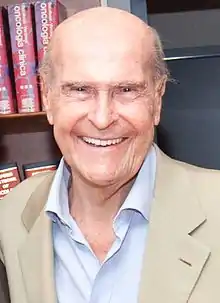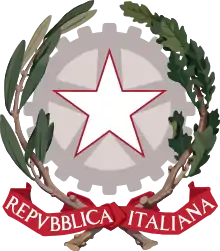Umberto Veronesi
Umberto Veronesi M.D. Knight Grand Cross OMRI (Italian pronunciation: [umˈbɛrto veroˈneːzi; -ˈneːsi]; 28 November 1925 – 8 November 2016) was an Italian oncologist, physician, scientist and politician, internationally known for his contributions on prevention and treatment of breast cancer throughout a career spanning over fifty years.
Umberto Veronesi | |
|---|---|
 | |
| Born | 28 November 1925 Milan, Italy |
| Died | 8 November 2016 (aged 90) Milan, Italy |
| Nationality | Italian |
| Alma mater | University of Milan |
| Known for | breast-conserving surgery in breast cancer treatment with the invention of the technique of quadrantectomy |
| Scientific career | |
| Institutions | European Institute of Oncology |
Umberto Veronesi | |
|---|---|
| Minister of Health | |
| In office 25 April 2000 – 11 June 2001 | |
| Prime Minister | Giuliano Amato |
| Preceded by | Rosy Bindi |
| Succeeded by | Girolamo Sirchia |
| Personal details | |
| Born | 28 November 1925 Milan, Italy |
| Died | 8 November 2016 (aged 90) Milan, Italy |
| Nationality | Italian |
| Political party | Democratic Party (2007–16) |
| Other political affiliations | Italian Socialist Party (1980s–1994) Independent (1994–2007) |
| Profession | Oncologist |
Early life and education
Veronesi was born in Milan. He obtained his degree in medicine from the University of Milan in 1952, and dedicated his professional life to the study and treatment of cancer.
Scientific career
After spending brief periods in England and France, he joined the Italian Cancer Institute in Milan as a volunteer. Veronesi challenged the dominant paradigm among surgeons that cancer could only be treated with aggressive surgery. He championed a paradigm shift in cancer care from “maximum tolerated” to “minimum effective” treatment.[1][2] He was a pioneer of breast-conserving surgery in early breast cancer as an alternative to a radical mastectomy. He developed the technique of quadrantectomy, which limits surgical resection to the affected quarter of the breast. Between 1973 and 1980 he led the first prospective randomised trial of breast conserving surgery (the Milan I trial), which compared outcomes from radical mastectomy against quadrantectomy. The results, published in 1981, [3] and confirmed in 2002 in a 20-year follow-up study, [4] played a key role in establishing breast conserving surgery as standard of care for patients with early breast cancer, alongside results from trials of lumpectomy led by the US breast surgeon Bernard Fisher. Veronesi supported and promoted scientific research aimed at improving conservative surgical techniques, including sentinel lymph node biopsy, which resulted in axillary dissection in breast cancer with clinically negative lymph nodes no longer being performed. He also contributed to breast cancer prevention conducting studies on tamoxifen and retinoids and verifying their capabilities to prevent the formation of carcinoma. He was an activist in anti-tobacco campaigns. In 1994 he founded the European Institute of Oncology, which he directed until his death. He was appointed President of the Scientific Committee of the Italy-USA Foundation in 2010. In 2009, through his foundation (Fondazione Veronesi), he started the project "Science for Peace", in order to promote peaceful relations through scientific development.[5]
He was Chairman of the BioGeM Scientific Committee.
Political career
- 1993 member of the national Commission against cancer.
- 1998 member of the national Commission for the evaluation of "Di Bella therapy" against cancer.
- 2000-2001 Minister of Health under the Amato II Cabinet.
- On 25 April 2000 he was appointed to the Amato II Cabinet as the minister of health[6] and was in office until 11 June 2001. He was instrumental in the promotion of the anti-smoking in public places act.
Ethical views
Over the years, Veronesi publicly expressed his views on several ethical issues in interviews, televised debates and his books.
Veronesi identified himself as an agnostic,[10] not believing in any form of afterlife. He claimed that human beings should not consider death a terrifying moment, but rather accept it as a biological necessity.[11]
He supported active euthanasia, affirming the right of any individual to end their life if it became unbearable due to suffering or loss of dignity. He advocated the necessity to regulate euthanasia at a national level, citing Dutch legislation as a good starting point;[12] he was promoting a campaign for the introduction of living will as a legally binding agreement between the doctor and the incapacitated patient.[13]
Veronesi supported genetically modified organisms as a way to produce food with higher nutritional capabilities and deprived of potentially carcinogenic substances. He criticized the current opposition to GMOs as being due to lack of scientific knowledge.[14]
Veronesi was an ethical vegetarian and an animal rights advocate.[15]
Awards
- Veronesi received thirteen national and international honorary degrees in Medicine, Medical Biotechnologies, Physics, Agricultural Sciences and Pedagogical Sciences.
- In 2002 he received the King Faisal International Prize. In this regard, he then stated:
"In recent years, I have been increasingly involved in curing Islamic women. They started to come to me and undergo surgery at the European Institute of Oncology (IEO) after I received in 2002 in Saudi Arabia the King Faisal International Prize for my studies on conservative breast surgery. As a matter of fact, for the Islamic world that recognition is a kind of Nobel.»[16]
- On 31 January 2004 he became honorary citizen of Asti.
- In 2009 he received the America Prize of the Italy–USA Foundation.
- On 2 August 2010, they named after him a piece of beachfront at Jesolo Beach.[17]
- In 2012 he received the "Art, Science and Peace Prize" for his career.[18]
See also
References
- https://www.frontiersin.org/articles/10.3389/fonc.2012.00125/full Veronesi U, Stafyla V, Luini A et al (2012) Breast cancer:from“maximum tolerable” to “minimum effective” treatment. Front Oncol 2:125
- https://www.thebreastonline.com/article/S0960-9776(16)30247-8/fulltext Curigliano G, Cardoso F, Costa A et al. (2017) From the maximum tolerable to the minimum effective treatment: Umberto Veronesi's life commitment to breast cancer care. Breast 31:241‒243
- [https://www.nejm.org/doi/10.1056/NEJM198107023050102 Veronesi U, Saccozzi R, Del Vecchio M et al. (1981) Comparing Radical Mastectomy with Quadrantectomy, Axillary Dissection, and Radiotherapy in Patients with Small Cancers of the Breast. N Engl J Med 305:6‒11
- https://www.nejm.org/doi/full/10.1056/nejmoa020989 Veronesi U, Cascinelli N, Mariani L et al. (2002) N Engl J Med 347:1227‒1232
- "Archived copy". Archived from the original on 27 August 2016. Retrieved 1 September 2016.CS1 maint: archived copy as title (link)
- "Giuliano Amato Italy's new Prime Minister". Cosmopolis. 6. May 2000. Retrieved 6 June 2013.
- http://www.businessweek.com/news/2010-10-27/italy-nuclear-agency-heads-to-be-named-oct-29-messaggero-says.html
- Migliaccio, Alessandra (12 November 2010). "Doctor Heading Italy's New Atomic Agency Pledges to Sell Nuclear Revival". Bloomberg.
- Rendina, Federico (4 September 2011). "Agenzia nucleare, Veronesi lascia". Il Sole 24 ORE (in Italian).
- https://www.youtube.com/watch?v=qFRMafUY3wc
- "Io voglio morire così". OK! La salute prima di tutto. February 2006. Retrieved 5 February 2007.
- "Veronesi difende l'eutanasia "Morire è un diritto fondamentale"". La Repubblica (in Italian). 18 November 2005. Retrieved 5 February 2007.
- Pappagallo, Mario (1 March 2006). "Veronesi: fate testamento biologico". Corriere Della Sera. Retrieved 5 February 2007.
- "Intervista all'ex Ministro della Salute Veronesi". La Stampa (in Italian). 28 October 2004. Retrieved 5 February 2007.
- "Umberto Veronesi: "Essere vegetariani è una conquista di civiltà"". L'espresso (in Italian). 19 March 2015. Retrieved 1 May 2017.
- Veronesi, Umberto (2010). Dell'amore e del dolore delle donne [Of love and pain of women] (in Italian). Turin: Einaudi. ISBN 978-88-06-20133-3.
- Zanutto, Mauro (2 August 2010). "Jesolo, Professor among the stars, named after Veronesi a stretch of the seafront". Corriere del Veneto (in Italian).
- Professor Umberto Veronesi’s Speech, Town Hall of Viareggio, Italy, 2 August 2012 (in Italian)
Sources
- "Official Biography". European Institute of Oncology. Archived from the original on 25 February 2007. Retrieved 5 February 2007.
External links
| Wikiquote has quotations related to: Umberto Veronesi |
| Wikimedia Commons has media related to Umberto Veronesi. |
- European Institute of Oncology Website (in Italian and English)
- ecancermedicalscience (Open Access journal of the European Institute of Oncology) (in English)
- Montanari disputes Veronesi on YouTube (in Italian)
- Fondazione Umberto Veronesi (in Italian and English)

